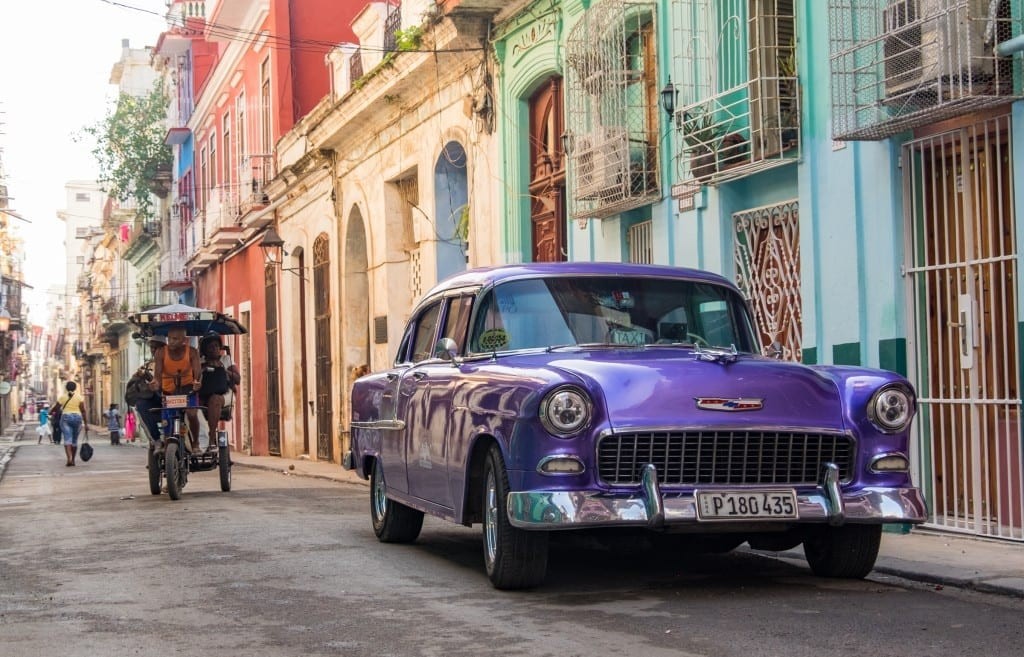Traveling to Cuba can be an exciting prospect for many, but the complexities surrounding U.S. regulations often leave American citizens wondering about the possibilities and limitations. At TRAVELS.EDU.VN, we’re here to clear up the confusion and guide you through the process of visiting Cuba, even from Canada, while staying compliant with U.S. laws and regulations. Are you wondering if American citizens can travel to Cuba from Canada? The answer is yes, but it requires understanding the regulations and having the right documentation.
At TRAVELS.EDU.VN, we understand the allure of Cuba’s vibrant culture and rich history. Let us help you explore the legal avenues available for American citizens to embark on this unforgettable journey, offering peace of mind and a seamless travel experience. With us, you’ll gain access to expert guidance, ensuring your trip to Cuba is not only memorable but also fully compliant with U.S. travel regulations.
1. What Are The Current U.S. Regulations For Travel To Cuba?
While the U.S. embargo on Cuba has been in place for decades, there are specific circumstances under which Americans can legally travel to the island. It’s crucial to understand these regulations to ensure your trip is compliant with U.S. law.
- Office of Foreign Assets Control (OFAC) General Licenses: The U.S. Department of the Treasury’s Office of Foreign Assets Control (OFAC) issues general licenses that authorize certain categories of travel to Cuba. These licenses eliminate the need to apply for a specific license, streamlining the travel process.
- 12 Authorized Categories of Travel: As of 2024, there are 12 categories of travel authorized by a general license. These include family visits, official government business, journalistic activity, professional research, educational activities, religious activities, public performances, support for the Cuban people, humanitarian projects, activities of private foundations, exportation/importation of information, and certain export transactions.
- “Support for the Cuban People” Category: A popular option for tourists is the “Support for the Cuban People” category. To qualify under this license, travelers must engage in activities that directly support Cuban citizens, such as staying in private accommodations (casas particulares), eating at privately owned restaurants (paladares), and purchasing goods from local vendors.
- Prohibited Activities: It’s important to avoid activities that primarily benefit the Cuban government. This includes staying at hotels owned by the government or engaging in recreational tourism. The U.S. State Department publishes a list of restricted entities that Americans are prohibited from transacting with.
According to the U.S. Embassy in Cuba, it is the traveler’s responsibility to ensure they meet the requirements of the general license under which they are traveling. Failure to comply with these regulations can result in penalties, including fines.
2. Can American Citizens Travel To Cuba From Canada?
Yes, American citizens can travel to Cuba from Canada, and it is a common route for those looking to bypass some of the direct travel restrictions from the U.S. Here’s how it works:
- Flying from Canada: Many airlines offer direct flights from major Canadian cities like Toronto and Montreal to various destinations in Cuba, including Havana, Varadero, and other popular tourist spots.
- Cuban Tourist Card: To enter Cuba, you will need a Cuban Tourist Card (also known as a Cuban visa). These cards are generally available for purchase at Canadian airports before boarding your flight. The cost typically ranges from $20 to $25 CAD.
- Compliance with U.S. Regulations: Even when traveling from Canada, U.S. citizens must still comply with U.S. regulations for travel to Cuba. This means you must travel under one of the 12 authorized categories and ensure your activities support the Cuban people.
- Documentation: Keep a record of your activities and expenses in Cuba, as the U.S. government may request this information to verify compliance with the authorized travel category. This includes receipts from casas particulares, paladares, and local businesses.
According to a report by the Congressional Research Service, the U.S. government has increased its scrutiny of travel to Cuba in recent years. Therefore, it is essential to maintain thorough documentation of your trip.
 A vibrant street in Havana with classic cars and colorful buildings.
A vibrant street in Havana with classic cars and colorful buildings.
3. What Are The Steps For Planning A Trip To Cuba From Canada As An American?
Planning a trip to Cuba from Canada involves several key steps to ensure compliance and a smooth travel experience.
- Determine Your Travel Category: Choose the category under which you will be traveling. For most tourists, the “Support for the Cuban People” category is the most suitable.
- Book Flights and Accommodation: Find a flight from a Canadian city to Cuba. Book accommodations at casas particulares or other privately owned establishments. TRAVELS.EDU.VN can assist with finding compliant options.
- Obtain a Cuban Tourist Card: Purchase a Cuban Tourist Card at the Canadian airport before your flight. Ensure you have the correct card (usually green) for those not flying directly from the U.S.
- Create an Itinerary: Plan activities that support the Cuban people. This can include visiting local markets, dining at paladares, taking salsa lessons, or exploring historical sites. TRAVELS.EDU.VN offers curated itineraries that meet these requirements.
- Document Your Activities: Keep receipts and records of your expenses to demonstrate compliance with U.S. regulations.
- Travel Insurance: Ensure you have travel insurance that covers medical expenses and other emergencies in Cuba.
- Inform Your Bank: Notify your bank and credit card companies of your travel plans to avoid any issues with your accounts. Remember that U.S.-issued credit and debit cards do not work in Cuba, so bring enough cash for your trip.
A study by the University of Havana’s Center for Demographic Studies found that tourism is a significant contributor to Cuba’s economy, particularly for small business owners. By supporting these businesses, travelers can comply with the “Support for the Cuban People” category.
4. What Activities Qualify Under The “Support For The Cuban People” Category?
To travel to Cuba under the “Support for the Cuban People” category, your activities must directly benefit Cuban citizens and not primarily benefit the Cuban government.
- Stay in Casas Particulares: Choose to stay in privately owned guesthouses rather than government-run hotels.
- Dine at Paladares: Eat at privately owned restaurants that offer authentic Cuban cuisine.
- Shop at Local Markets: Purchase souvenirs and goods from local artisans and vendors.
- Take Local Tours: Participate in tours and activities led by local guides, such as walking tours of Old Havana or visits to tobacco farms in Viñales.
- Attend Cultural Events: Attend concerts, dance performances, and art exhibitions that showcase Cuban culture.
- Engage in Volunteer Work: Participate in volunteer activities, such as helping with community projects or teaching English.
- Support Local Transportation: Use local transportation, such as taxis and buses, instead of renting cars from government-owned agencies.
TRAVELS.EDU.VN specializes in creating itineraries that maximize your support for the Cuban people, ensuring a meaningful and compliant travel experience.
 A colorful scene from a cooking class in Cuba, with participants preparing lobster dishes.
A colorful scene from a cooking class in Cuba, with participants preparing lobster dishes.
5. What Activities Should American Travelers Avoid In Cuba?
While engaging in activities that support the Cuban people is encouraged, there are certain activities that American travelers should avoid to remain compliant with U.S. regulations.
- Staying at Restricted Hotels: Avoid staying at hotels that are owned or controlled by the Cuban government. The U.S. State Department maintains a list of restricted entities that Americans are prohibited from transacting with.
- Using Government-Owned Services: Refrain from using services provided by government-owned agencies, such as car rental companies or tour operators.
- Engaging in Purely Recreational Tourism: Avoid activities that are primarily for leisure and do not directly support the Cuban people. This includes spending excessive time on beaches or at resorts without engaging in cultural or educational activities.
- Making Prohibited Transactions: Do not make financial transactions with entities on the U.S. State Department’s restricted list.
- Supporting the Cuban Government: Avoid activities that primarily benefit the Cuban government rather than the Cuban people.
According to a report by the U.S.-Cuba Trade and Economic Council, the U.S. government has stepped up enforcement of the Cuban Assets Control Regulations in recent years. Therefore, it is crucial to avoid any activities that could be construed as violating these regulations.
6. How Can TRAVELS.EDU.VN Help Plan Your Trip To Cuba?
TRAVELS.EDU.VN is dedicated to providing American citizens with the resources and expertise needed to plan a legal and enriching trip to Cuba from Canada.
- Custom Itineraries: We create personalized itineraries that comply with the “Support for the Cuban People” category, ensuring your activities directly benefit Cuban citizens.
- Accommodation Assistance: We help you find and book accommodations at casas particulares and other privately owned establishments.
- Activity Recommendations: We recommend cultural, educational, and volunteer activities that support the Cuban people.
- Documentation Guidance: We provide guidance on the documentation you need to maintain to demonstrate compliance with U.S. regulations.
- Travel Insurance: We offer assistance in finding travel insurance that covers your trip to Cuba.
- Expert Advice: Our team of travel experts is available to answer your questions and provide up-to-date information on U.S. regulations for travel to Cuba.
- Contact Information:
- Address: 123 Main St, Napa, CA 94559, United States
- WhatsApp: +1 (707) 257-5400
- Website: TRAVELS.EDU.VN
- Contact Information:
A survey conducted by the Pew Research Center found that a majority of Americans support ending the U.S. embargo on Cuba. By traveling to Cuba in a way that supports the Cuban people, you can contribute to positive change on the island.
7. What Are The Potential Risks Of Traveling To Cuba As An American?
While travel to Cuba is generally safe, there are some potential risks that American travelers should be aware of.
- Enforcement of U.S. Regulations: The U.S. government may scrutinize your travel activities to ensure compliance with the Cuban Assets Control Regulations. Failure to comply can result in fines and other penalties.
- Limited Access to Funds: U.S.-issued credit and debit cards do not work in Cuba, so you must bring enough cash for your trip. Running out of money can be a significant problem.
- Health Concerns: Cuba’s healthcare system may not be up to the standards of the U.S., so it is important to have travel insurance that covers medical expenses and other emergencies.
- Petty Crime: Petty crime, such as pickpocketing, can occur in tourist areas. Take precautions to protect your belongings.
- Political Sensitivities: Be mindful of political sensitivities and avoid engaging in activities that could be construed as critical of the Cuban government.
According to the U.S. Department of State, while the Cuban government generally does not target American tourists, U.S. citizens are subject to Cuban laws.
 Men tending to tobacco fields in Viñales, Cuba.
Men tending to tobacco fields in Viñales, Cuba.
8. How Can You Minimize Risks And Ensure A Safe Trip?
To minimize risks and ensure a safe trip to Cuba, follow these tips:
- Comply with U.S. Regulations: Ensure you are traveling under one of the 12 authorized categories and that your activities support the Cuban people.
- Document Your Activities: Keep receipts and records of your expenses to demonstrate compliance with U.S. regulations.
- Bring Enough Cash: Bring enough cash to cover your expenses, as U.S.-issued credit and debit cards do not work in Cuba.
- Purchase Travel Insurance: Purchase travel insurance that covers medical expenses and other emergencies.
- Protect Your Belongings: Take precautions to protect your belongings from petty crime.
- Be Respectful: Be respectful of Cuban culture and customs, and avoid engaging in activities that could be construed as critical of the Cuban government.
- Stay Informed: Stay informed about current events and any travel advisories issued by the U.S. Department of State.
- Register with the U.S. Embassy: Register your travel plans with the U.S. Embassy in Havana so they can contact you in case of an emergency.
A study by the World Tourism Organization found that sustainable tourism practices can enhance the safety and security of travelers. By supporting local businesses and engaging in responsible tourism, you can contribute to a safer and more enjoyable travel experience.
9. What Travel Insurance Is Recommended For Cuba?
Travel insurance is a must for any trip, but it’s especially crucial for Cuba. Not all insurance providers offer coverage in Cuba due to U.S. regulations, so it’s essential to find one that does. Here are some factors to consider:
- Medical Coverage: Ensure your policy covers medical expenses, including emergency medical evacuation. Cuba’s healthcare system may not meet U.S. standards, so having comprehensive medical coverage is vital.
- Trip Interruption and Cancellation: Look for a policy that covers trip interruption and cancellation in case of unforeseen circumstances, such as illness or a family emergency.
- Lost or Stolen Belongings: Make sure your policy covers lost or stolen belongings, including luggage, electronics, and cash.
- 24/7 Assistance: Choose a provider that offers 24/7 assistance in case of emergencies.
- COVID-19 Coverage: With the ongoing pandemic, ensure your policy covers COVID-19-related expenses, such as testing, quarantine, and medical treatment.
Some reputable travel insurance providers that offer coverage in Cuba include:
- Allianz Travel Insurance: Allianz offers a range of travel insurance plans that cover medical expenses, trip interruption, and lost belongings in Cuba.
- World Nomads: While they previously offered coverage in Cuba, it’s essential to verify their current coverage status, as policies can change.
- Travel Guard: Travel Guard provides comprehensive travel insurance plans that include medical coverage, trip cancellation, and lost luggage.
Before purchasing a policy, carefully review the terms and conditions to ensure it meets your specific needs and provides adequate coverage for your trip to Cuba.
10. Frequently Asked Questions (FAQ) About American Travel To Cuba From Canada
Here are some frequently asked questions about American travel to Cuba from Canada:
- Can I use my U.S. passport to travel to Cuba from Canada?
- Yes, you can use your U.S. passport to travel to Cuba from Canada. However, you must also comply with U.S. regulations for travel to Cuba.
- Do I need a visa to travel to Cuba from Canada?
- Yes, you need a Cuban Tourist Card (visa) to enter Cuba. You can purchase this card at most Canadian airports before boarding your flight.
- Can I use U.S. credit cards or debit cards in Cuba?
- No, U.S.-issued credit and debit cards do not work in Cuba. You must bring enough cash to cover your expenses.
- What activities qualify under the “Support for the Cuban People” category?
- Staying in casas particulares, dining at paladares, shopping at local markets, taking local tours, and engaging in volunteer work all qualify under this category.
- What activities should I avoid in Cuba?
- Avoid staying at restricted hotels, using government-owned services, engaging in purely recreational tourism, and making prohibited transactions with entities on the U.S. State Department’s restricted list.
- Do I need to keep records of my activities in Cuba?
- Yes, you should keep receipts and records of your expenses to demonstrate compliance with U.S. regulations.
- Is it safe to travel to Cuba as an American?
- Yes, travel to Cuba is generally safe, but it is important to be aware of potential risks and take precautions to protect your belongings.
- Do I need travel insurance to travel to Cuba?
- Yes, travel insurance is required to visit Cuba, and you may be asked for proof at immigration.
- Can TRAVELS.EDU.VN help me plan my trip to Cuba?
- Yes, TRAVELS.EDU.VN offers custom itineraries, accommodation assistance, activity recommendations, documentation guidance, and expert advice to help you plan a legal and enriching trip to Cuba.
- What should I do if I encounter problems while traveling in Cuba?
- If you encounter problems while traveling in Cuba, contact the U.S. Embassy in Havana for assistance.
Traveling to Cuba as an American citizen from Canada is possible, but it requires careful planning and compliance with U.S. regulations. By following the steps outlined in this guide and working with TRAVELS.EDU.VN, you can ensure a safe, legal, and enriching travel experience. Contact us today to start planning your trip to Cuba!
At TRAVELS.EDU.VN, we understand that navigating the complexities of international travel can be daunting. That’s why we’re committed to providing you with the expert guidance and resources you need to embark on your Cuban adventure with confidence. Whether you’re seeking a romantic getaway, a cultural immersion, or an opportunity to support the Cuban people, we’re here to make your travel dreams a reality.
Ready to experience the magic of Cuba? Contact TRAVELS.EDU.VN today for personalized travel assistance!
- Address: 123 Main St, Napa, CA 94559, United States
- WhatsApp: +1 (707) 257-5400
- Website: travels.edu.vn